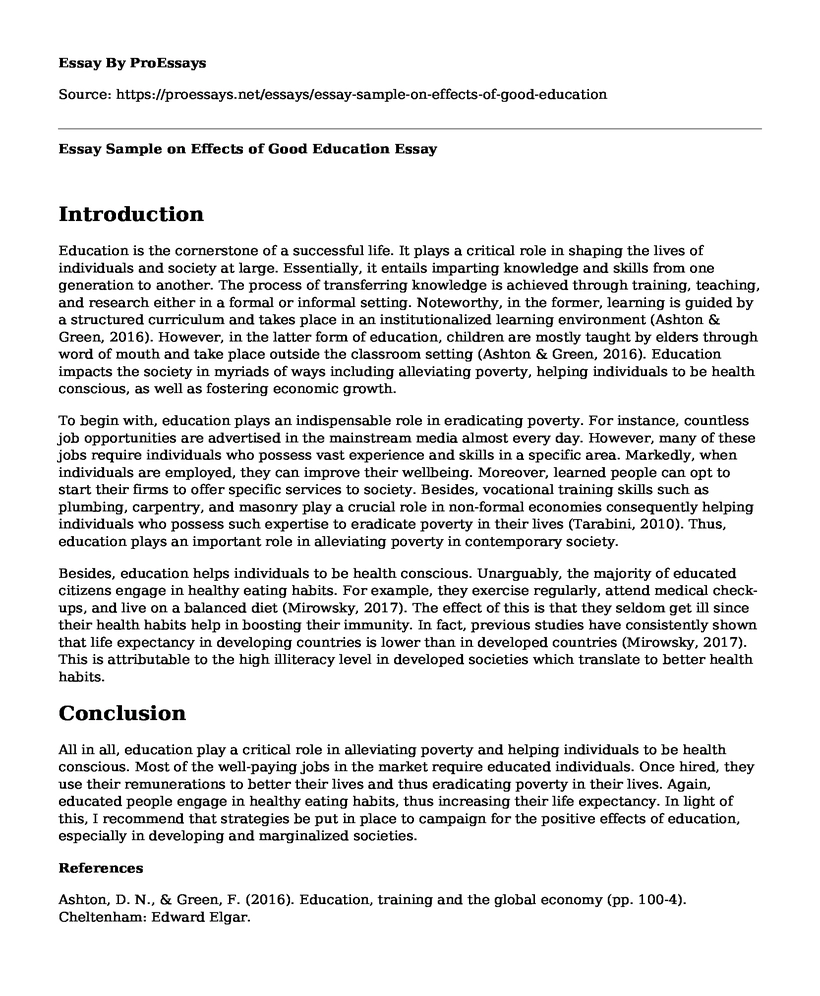Introduction
Education is the cornerstone of a successful life. It plays a critical role in shaping the lives of individuals and society at large. Essentially, it entails imparting knowledge and skills from one generation to another. The process of transferring knowledge is achieved through training, teaching, and research either in a formal or informal setting. Noteworthy, in the former, learning is guided by a structured curriculum and takes place in an institutionalized learning environment (Ashton & Green, 2016). However, in the latter form of education, children are mostly taught by elders through word of mouth and take place outside the classroom setting (Ashton & Green, 2016). Education impacts the society in myriads of ways including alleviating poverty, helping individuals to be health conscious, as well as fostering economic growth.
To begin with, education plays an indispensable role in eradicating poverty. For instance, countless job opportunities are advertised in the mainstream media almost every day. However, many of these jobs require individuals who possess vast experience and skills in a specific area. Markedly, when individuals are employed, they can improve their wellbeing. Moreover, learned people can opt to start their firms to offer specific services to society. Besides, vocational training skills such as plumbing, carpentry, and masonry play a crucial role in non-formal economies consequently helping individuals who possess such expertise to eradicate poverty in their lives (Tarabini, 2010). Thus, education plays an important role in alleviating poverty in contemporary society.
Besides, education helps individuals to be health conscious. Unarguably, the majority of educated citizens engage in healthy eating habits. For example, they exercise regularly, attend medical check-ups, and live on a balanced diet (Mirowsky, 2017). The effect of this is that they seldom get ill since their health habits help in boosting their immunity. In fact, previous studies have consistently shown that life expectancy in developing countries is lower than in developed countries (Mirowsky, 2017). This is attributable to the high illiteracy level in developed societies which translate to better health habits.
Conclusion
All in all, education play a critical role in alleviating poverty and helping individuals to be health conscious. Most of the well-paying jobs in the market require educated individuals. Once hired, they use their remunerations to better their lives and thus eradicating poverty in their lives. Again, educated people engage in healthy eating habits, thus increasing their life expectancy. In light of this, I recommend that strategies be put in place to campaign for the positive effects of education, especially in developing and marginalized societies.
References
Ashton, D. N., & Green, F. (2016). Education, training and the global economy (pp. 100-4). Cheltenham: Edward Elgar.
Tarabini, A. (2010). Education and poverty in the global development agenda: Emergence, evolution, and consolidation. International Journal of Educational Development, 30(2), 204-212.
Mirowsky, J. (2017). Education, social status, and health. Routledge.
Cite this page
Essay Sample on Effects of Good Education. (2022, Nov 23). Retrieved from https://proessays.net/essays/essay-sample-on-effects-of-good-education
If you are the original author of this essay and no longer wish to have it published on the ProEssays website, please click below to request its removal:
- The Notion of Truth Values in Semantics
- Translating a Poem: Der Fichtenbaum und die Palme by Heinrich Heine
- Role of Teacher in Determining the Academic Performance of Students - Reflective Essay
- Article Analysis Essay on Historically Black Colleges & Universities: Their Significance in 21st Century
- Essay Sample on Achieve Success: Learn with Great Teacher Leadership
- Essay Exampel on Tech Revolution: Enhancing Learning for Young Children
- Social Media Use - Essay Example







